 |
 |
|
|
|
|
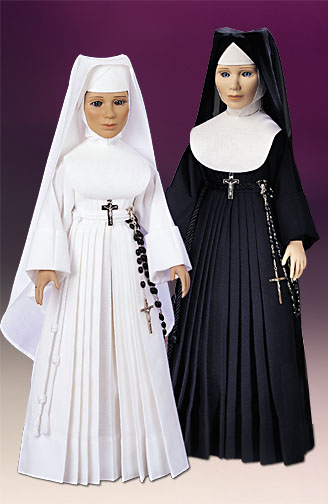 The Congregation was founded in Le Puy, France, in 1650. Disbanded during the French Revolution, it was later reorganized by Mother St. John Fontbonne in 1808. In 1836, she sent six Sisters to establish the first foundation in the United States. Their purpose was the instruction of youth, managing charitable institutions, orphanages, schools for the deaf as well as other works of charity. During the 19th and 20th centuries, American communities sent missionaries to Jamaica, Hawaii, Puerto Rico, British Honduras, Mexico, and the Bahamas. In 1919, Pope Benedict XV called for an overhaul and rejuvenation of Mission work in non Christian lands. He pointedly commended missionary sisters for their ongoing efforts. American communities expanded mission schools, orphanages, medical clinics, and charitable apostolates in these mission territories. The Sisters of St. Joseph normally wear a black habit, but white was deemed cooler for the warmer climates of these missions. |
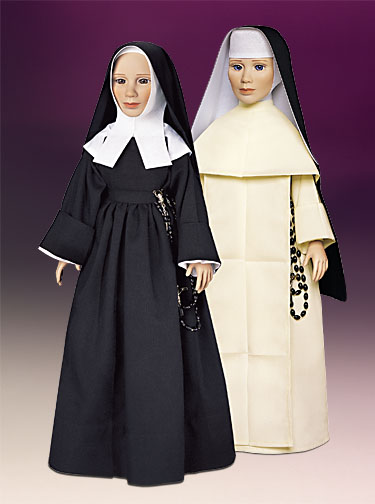 The Sisters of Charity of Nevers are best known for their most famous sister, Bernadette Soubirous, of Lourdes, France. On September 2, 1853, led by Mother Joseph, four Sisters of St. Dominic from the Holy Cross Convent in Ratisbon, Bavaria came to the city of Brooklyn. The four pioneer Sisters began their work of education in Holy Trinity Parish, Brooklyn and can now be found in numerous missions in New York and Puerto Rico. They specialize in education, in addition to other works of charity, such as nursing, domestic service in hospitals, seminaries, homes for the aged and summer camps. |
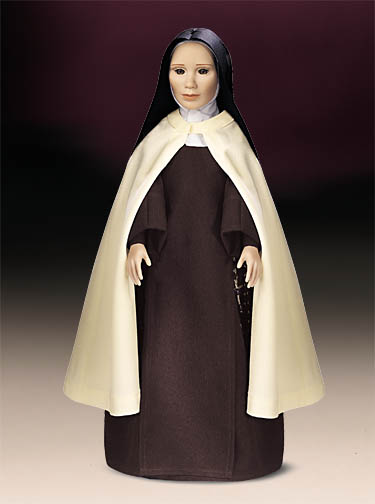 The Discalced or Reformed Carmelite, a branch of the Order of Our Lady of Mount Carmel, was founded by St. Teresa of Avila, in 1562. Before her death, she established 16 Monasteries of Nuns. The first monastery of the Second Order of Carmel was established in the U.S. in 1790. Her apostolic life is spent in supplication; praying for the needs of the Church, salvation of souls, and conversion of sinners. |
|
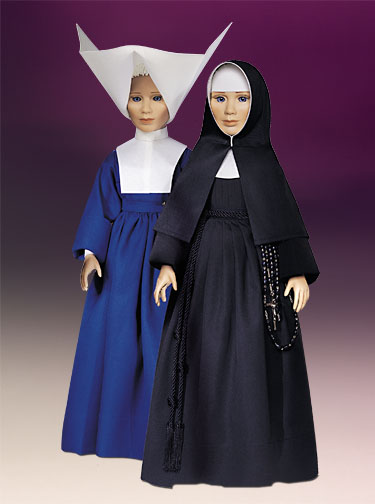 St. Vincent de Paul gathered a group of pious country girls and sent them out to the garrets of Paris. In 1809, Elizabeth Ann Seton established a branch of these Sisters at Emmitsburg, Maryland. Their motto: “The charity of Christ urges us”; their methods the most modern and efficient, for the poor deserve only the best. Over 45,000 Sisters minister to every misery known to mankind in all nations under the sun. It was this congregation's habit which inspired The Flying Nun television series of the mid-1960s. In 1851, Catherine Kasper and associates took their vows in Dembach, Germany. In 1868 the first Poor Handmaids came to America, where they ran hospitals, schools, and homes for children and age. |
|
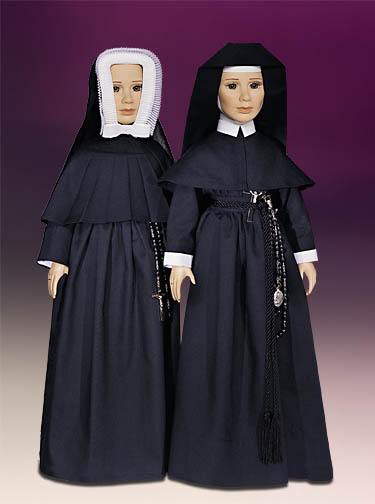 The Community of the Sisters of Charity of Saint Elizabeth was founded in Newark, New Jersey, on September 29, 1859, by Mother Mary Xavier Mehegen at the request of the Most Reverend James Roosevelt Bayley, first Bishop of Newark. The Bishop was the nephew of Mother Elizabeth Ann Bayley Seton, Foundress of the Sisters of Charity in the U.S. The Sisters are noted for the pleated habit worn under their apron. The Foundress was Mary Ward, an Englishwoman. The American Generalate of the Institute was founded in Toronto, Canada, in 1847 by the Ladies of Loretto Ireland. Mary Ward established the first institute in 1609 in Belgium as an uncloistered community to serve the needs of the Church. |
|
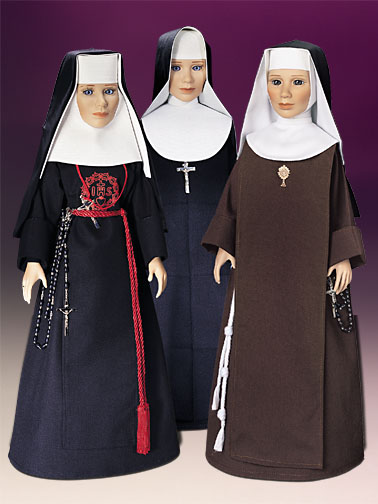 The Congregation of the Sisters of Charity of the Incarnate Word was founded by the Most Reverend Claude M. Dubuis at Galveston, Texas, in 1866. The first sisters received their religious training at the Monastery at Lyons, France. The foundation made at San Antonio in 1869 became an independent Community in 1870. It conducts hospitals, orphanages, elementary and secondary schools, and colleges. In 1907, the Congregation of the Sisters of St. Casimir was founded in Scranton, Pennsylvania, by Mother Maria, and co-foundresses, Mother M. Immaculate and Mother M. Concepta. In 1911, the Sisters established their Motherhouse and Novitiate in Chicago, Illinois. The Sisters ministering includes works of charity, the education of youth, nursing, care of the aged and social work. Mother Angelica, through her work on EWTN, has brought the works of this community into the homes of all Catholics. This order was founded on December 8, 1854 by Fr. Bonaventure, OFM, and Mother Marie de St. Clair Bouilleveaux. The sisters of the original congregation were teachers, then after the PCPA's were founded, they became cloistered. |
|
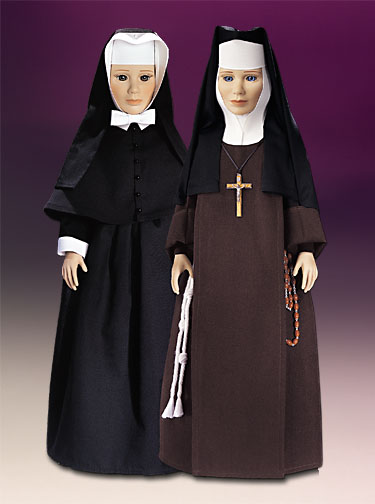 Pauline von Mallinckrodt founded this community in Germany in 1849 after Dr. Herman Schmidt placed the hands of little blind girls into hers, knowing that they clasped those of a perfect friend. Founded in Warsaw, Poland in 1855. In a few small rooms, Mother Sophia Truszkowski established a sanctuary for the poor of the city. Expanding throughout the world, the congregation extended into the United States in 1874, when a small group arrived in Polonia, Wisconsin. The Sisters ministering include education and charitable works in orphanages, hospitals and homes for the aged. |
|
|
This congregation came into existence in the United States in Chicago, Illinois in 1894. Under the leadership of its Foundress, Mother Mary Theresa Dudzik and co-foundress Mother Mary Anna Wisinski. They teach elementary through high school level, catechetical centers, homes for the aged, hospitals and a free dispensary for the poor, and a bookkeeping and domestic department for Father Flanagan’s Boys’ Home. (The Congregation of which Blessed Faustina Kowalska belonged) Founded in 1862 in Warsaw, Poland, by Mother Teresa Eva Potocka. On February 22, 1931, Sr. Faustina Kowalska saw a vision of Jesus with rays of mercy streaming from the area of His Heart. He told her to have the image painted to represent this vision and to sign it “Jesus, I Trust In You!” This would be the first of many revelations. |
|
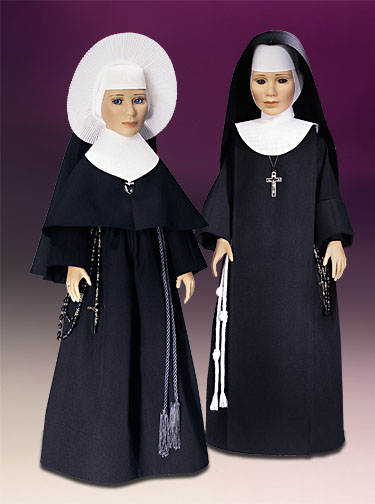 The Reverend Basil Anthony Moreau founded this pontifical congregation in France in 1841. In 1843 established their first American foundation, at Notre Dame, Indiana. They expanded worldwide, establishing hospitals, orphanages and schools from elementary through college. Today, the Sisters have a motherhouse at Saint Mary's and Notre Dame, Indiana, and three provinces in the United States. The Congregation was founded in Campbellsport Wisconsin, in 1874 by Mother A. Alexia, who left her homeland of Germany with Mother M. Alfons and Sister M. Clare when their small Franciscan community, which cared for orphans, was dissolved at the time of the May Laws. Ministering care for the sick and the education of youth, the new American Congregation flourished and spread. |
|
 The Order of St. Ursula was founded by Angela Merici in Brescia, Italy, in 1535. The History of the Ursulines is a history of pioneering. Venerable Mary of the Incarnation came to Quebec in 1639 as the first woman missionary. In 1727, a group of French Ursulines landed in New Orleans, to found the first Catholic School for Girls in America. In addition to their three simple vows, the Ursulines have been from the beginning involved in teaching. The Sisters of the Incarnate Word and Blessed Sacrament were founded in Lyons, France in 1625. The Community, originally cloistered, was suppressed during the French Revolution and re-established in 1832. The first American community was established in 1852 in Brownsville, Texas. |
|
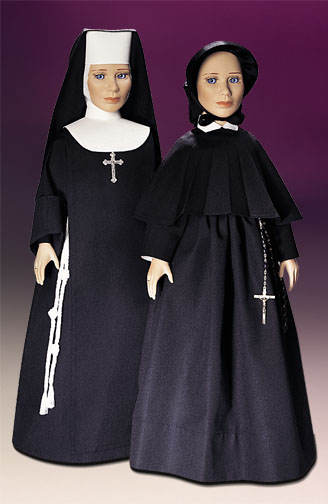 This pontifical congregation was established at Stevens Point, Wisconsin. Forty-six sisters led by Mother Mary Clara and Mother Mary Felicia opened a foundation there in 1901. Besides its dedication to education, the order maintained hospitals and nursing schools. Mother Elizabeth Seton founded this congregation in Emmitsburg, Maryland, in 1809. In 1847, a separate New York Motherhouse was established. The purpose of this community is to honor Jesus Christ, the source of all charity, by the education of the young and the poor of every walk of life who may need their assistance. |
|
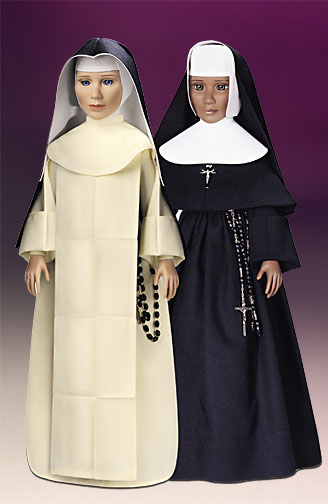 The American Congregation of the Most Holy Rosary was founded by Dominican Missionary-Apostolic, the Reverend Samuel Charles Mazzuchelli. On August 15, 1849, four American girls made their first profession at Sinsinawa, Wisconsin. The aim of the congregation is “To contemplate and to give others the fruits of contemplation.” The Sisters teach throughout the United States. This Congregation was established in New Orleans in 1842. Maria Henrietta Delille and Juliette Gaudin dedicated their community to the fields of charity and the education of their own people. |
|
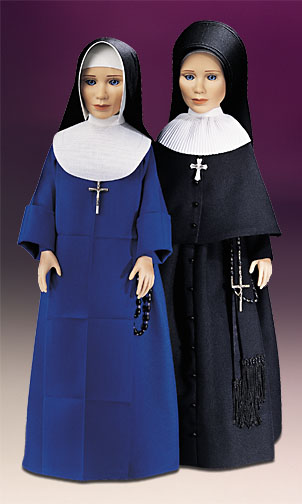 The Redemptorist Father Louis Florent Gillet founded a Community at Monroe, Michigan, in 1845. Three women established mission schools in the area. The first purpose of the Sisters is to make saints of themselves. The second follows closely the sanctification of others, chiefly through education of children, nursing, and social work. Founded on the first Sunday of Advent in 1875 in Rome, by Mother Mary Francis Siedliska. The congregation established convents in Poland, England, France and the United States. Partly contemplative and partly active, the Sisters aim to glorify God and to correspond to his love by striving for sanctification. The Sisters teach students of all ages, and serve at nursing hospitals and child care institutions. |
|
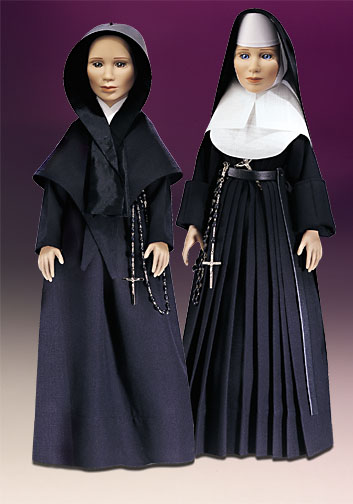 Founded in 1692 in Montefiascone, Italy, by Saint Lucia Filippini, (canonized by His Holiness, Pope Pius XI, June 22, 1930). In August 1910, according to the wishes of Saint Pius X, five sisters left Italy and established a foundation in the United States at Morristown, New Jersey. Their devotion to the promotion of Christ by example, the sanctification of its member, and the education of youth includes teaching in elementary schools, missionary activities, catechetical instruction, social work as well as other parish activities. The Sisters of Mercy were founded by Mary Catherine McAuley in Dublin, Ireland, December 12, 1831. The first American foundation was established in Pittsburgh in 1843. Three years later, at the invitation of Chicago's first Bishop, five Sisters came from Pittsburgh to open the very first Catholic school in Chicago. In the Chicago Province, the Sisters labored in sixty-five institutions, including forty-five elementary schools, seven high schools, a college, eight hospitals and four homes for business girls. The Sisters of Mercy expanded into over 100 dioceses and Archdiocese throughout the U. S. including in the Diocese of Brooklyn. |
|
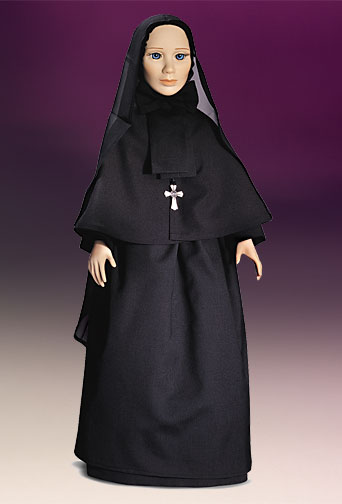 Saint Francis Xavier Cabrini (1850-1917), “America’s First Citizen-Saint in 1946,” founded the Missionary Sisters of the Sacred Heart at Codogno, Italy, in 1880. Saint Mother Cabrini established foundations throughout Europe, and at the request of Pope Leo XIII, came to the United States in 1889. |
|
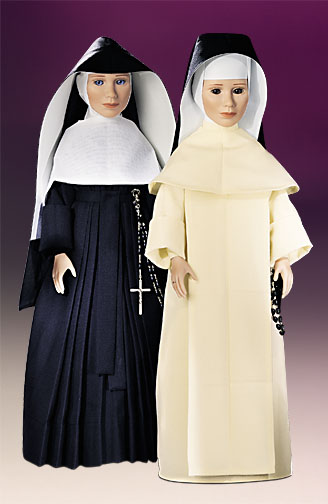 The Dominican Sisters of Adrian trace their ancestry back to the thirteenth century at Holy Cross Convent, Ratisbon, Bavaria. In 1853 four Sisters came to New York and in 1877 a small group from the New York convent moved to Michigan. Their ministry includes the education of youth, care of the sick, and providing missions and social services throughout the United States and Latin America. |
|
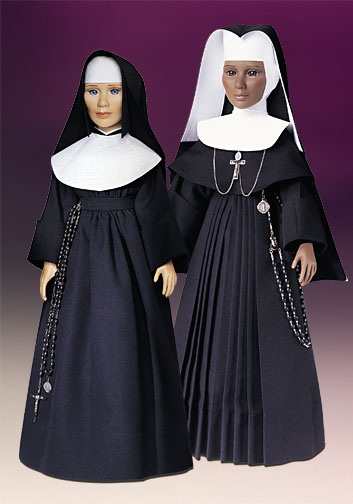 The Institution of the Sisters of Notre Dame de Namur was founded in Amiens, France, in 1803 by Blessed Julie Billiart. Later the Motherhouse was transferred to Namur, Belgium - hence the name. From there the Sisters established foundations in England, Scotland, Italy, Belgian Congo, South Africa, China, Japan, Hawaii, and the United States, (where the first school opened in Cincinnati, Ohio, in 1840). The Sisters of Notre Dame de Namur are primarily a teaching order. (First Black Community in the United States) Founded by Father James Joubert and Mother Mary Elizabeth Lange on July 2, 1829, in Baltimore, Maryland. In the lower chapel of old St. Mary's Seminary, Fr. Joubert taught catechism to the children of African heritage. He found this a difficult task when faced with underprivileged children who could not read or write, they inspired him to organize a school and congregation of women devoted to teaching. |
|
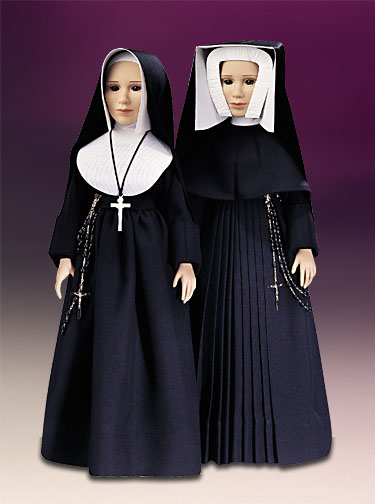 The Sisters of Providence from Ruille, France, came to Saint Mary-of-the-Woods on October 22, 1840. The Congregation honors Divine Providence a great zeal for the glory of God, and an ardent desire to acquire perfection and to contribute to the sanctification of their neighbor. This is achieved through the education of children of all ages, nursing and other technical and domestic positions. Devoted to education and popularly called “the B.V.M.’s,” the Congregation of the Sisters of the Blessed Virgin Mary was founded in Philadelphia, in 1833, by Mother Mary Frances Clarke. In 1843, the Sisters transferred their Motherhouse and Novitiate to the Diocese of Dubuque, Iowa. In the schools, they were assigned to teaching, nursing, secretarial, library or various other departments. Their unusual veil was to imitate a coffin which was meant to symbolize that the Sister was "dead" to worldly desires. |
|
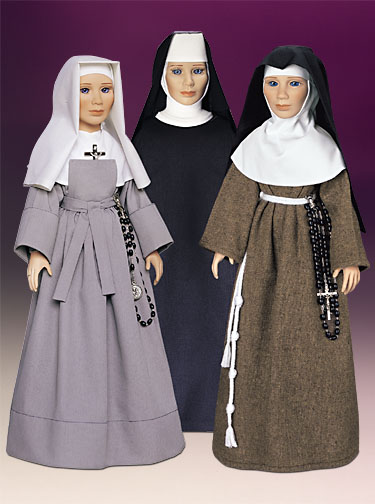 The Congregation was founded on February 2, 1703 by St. Louis-Marie de Montfort who invested Marie-Louise Trichet as the first Daughter of Wisdom. Their habit is made of coarse gray serge. A large linen handkerchief covers the shoulders, and a starched white linen headdress is worn in lieu of a veil. The habit became a symbol of Christ's love as the sisters worked tirelessly among the poor and sick; later it became a symbol of faith and courage as the sisters mounted the scaffold to their deaths during the days of the French Revolution. The Order of St. Benedict has its motto, “That in all things God may be glorified.” The order was founded by St. Benedict in the fifth century. The Benedictine Order is one of the world's oldest religious orders and is found throughout the world. The first American congregation began at St. Mary's Convent, Pennsylvania. Their life is contemplative with the sanctification of her own soul through dedication to Christ. Saint Clare of Assisi (1194-1253), was the first Abbress of San Damiano, Assisi, in Italy. At the age of eighteen, this young heroine vowed herself to the service of Jesus Christ and received her habit from Saint Francis of Assisi himself, in 1212. Thus was instituted the Order of Poor Clares, of the Second Order of St. Francis. |
|
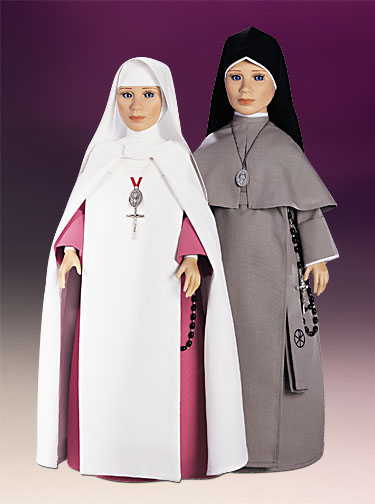 Mother Mary Joseph of Boston, Massachusetts, founded this foreign missionary society at Maryknoll, New York, in 1912. In 1920, they were canonically erected as the Foreign Mission Sisters of St. Dominic. Twelve years later, a cloistered branch was instituted. Their purpose is to engage in all types of mission work, both at home and abroad, conducting schools and medical clinics in nearly all their missions. |
|
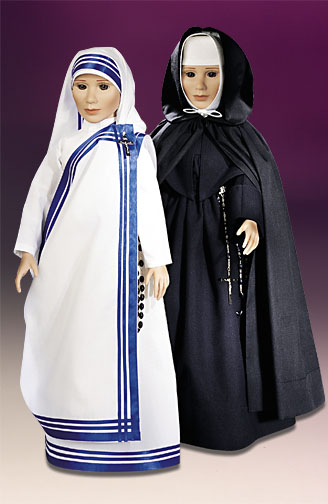 |
|
|
The Missionaries of Charity were founded in India in 1950, by Mary Teresa Bejaxhiu. The Sisters serve the poorest of the poor throughout the world. In the United States, they maintain five Centers of Formation, as well as many soup kitchens, shelters, camps for poor children, homes for the dying and other ministries. The order survives on the Love of God, and by donations given by persons of all faiths. The Little Sisters of the Poor provided homes, and care for the aged poor. Inspired by the love of God and the love of His Poor, the Little Sisters of the Poor add to the vows of Poverty, Chastity and Obedience the Vow of Hospitality. The black mantle is worn over the habit in the Chapel and when traveling. The headdress is a plain white bonnet with a forehead band as a symbol of obedience. |
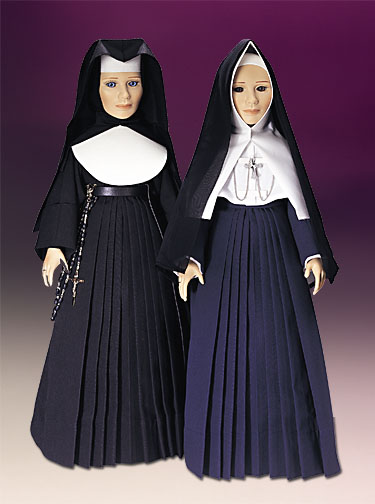 When the Penal Laws against Catholics were in full force in Ireland in 1779, Nano Nagle founded the Sisters to instruct the children of the poor in their Catholic Faith. In 1884, the community founded its first foundation in the United States. The purpose of this congregation is the sanctification of its members by the observance of their Vows. The special type of work characteristic of this congregation is the education of youth. The Institute of the Religious of the Sacred Heart of Mary was founded in 1849 by Pere Gailhac, in Beziers, Southern France. Before the end of the nineteenth century, they were established in Ireland, Portugal, England, Spain, and the United States. The central house in America is Marymount College, Tarrytown, New York. The particular work to which the Institute is dedicated is teaching of all age levels. |
|
|